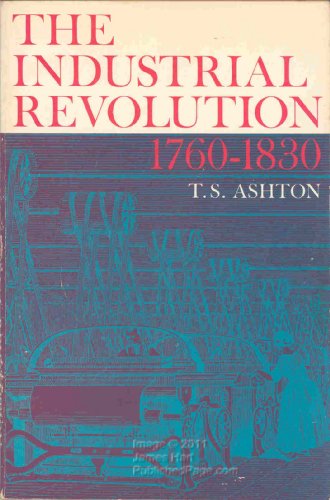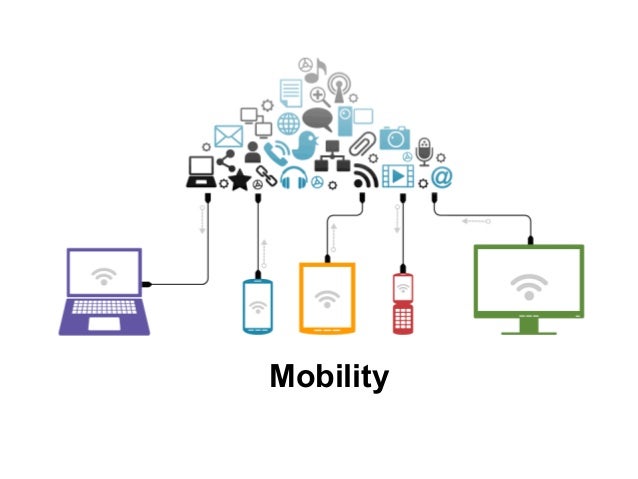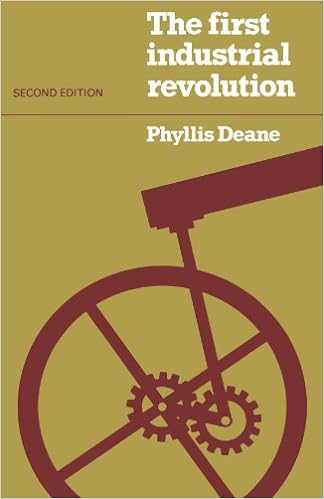
Professor of Economic History Helsingin yliopisto industrial revolutions, which are characterized by their ability to transform economies, jobs and even society itself through the introduction of new technologies and processes. Beginning in the late 18th century with the advent of steam power and the invention of the power loom, the first industrial revolution ushered
The First Industrial Revolution Introducing The
THE SECRET HISTORY OF THE INDUSTRIAL REVOLUTION. the Industrial Revolution could, if necessary, have still been powered by water wheels even as late as the 1860s. Advances in textiles and agriculture explain the majority of the Industrial Revolution. The diverse nature of productivity advance in this era makes the Industrial, First Industrial Revolution vs. Second Industrial Revolution - Article detailing the history of the Industrial Revolution with a focus on the First and Second Industrial Revolution's. Great for detailing the history and significance of the different time.
Industrial Revolution or the American Industrial Revolution. Over the first half of the century, the country expanded greatly, and the new territory was rich in natural resources. Completing the first transcontinental railroad in 1869 was a major milestone, making it easier to transport people, raw materials, and products. The United States A new industrial era, which The Economist describes as the Third Industrial Revolution, is under way. Enormous change is in the offing. At the moment, digitization is creating a new mindset among industrial planners.
Origins of the Industrial Revolution. The first Industrial Revolution began in Great Britain after 1750. There were several factors that combined to make Great Britain an ideal place for industrialization. First, the Agricultural Revolution of the 18th century created a favorable climate for industrialization. First Industrial Revolution vs. Second Industrial Revolution - Article detailing the history of the Industrial Revolution with a focus on the First and Second Industrial Revolution's. Great for detailing the history and significance of the different time
Industrial Revolution, in modern history, the process of change from an agrarian and handicraft economy to one dominated by industry and machine manufacturing. The process began in Britain in the 18th century and from there spread to other parts of the world, driving changes in energy use, socioeconomics, and culture. First Industrial Revolution vs. Second Industrial Revolution - Article detailing the history of the Industrial Revolution with a focus on the First and Second Industrial Revolution's. Great for detailing the history and significance of the different time
industrial economy.4 For more than a century the realms famous transformation has been narrated and explained under such labels as The First Industrial Revolution, the First Industrial Nation, or simply as The Industrial Revolution. Anglo-American historians have analysed the decades and cycles of The Industrial Revolution From England to North America to the World Slideshare uses cookies to improve functionality and performance, and to provide you with relevant advertising. If you continue browsing the site, you agree to the use of cookies on this website.
The Industrial Revolution From England to North America to the World Slideshare uses cookies to improve functionality and performance, and to provide you with relevant advertising. If you continue browsing the site, you agree to the use of cookies on this website. 2015-03-23В В· Most leaders don't even know the game they are in - Simon Sinek at Live2Lead 2016 - Duration: 35:09. Simon Sinek Recommended for you
Industrial Revolution or the American Industrial Revolution. Over the first half of the century, the country expanded greatly, and the new territory was rich in natural resources. Completing the first transcontinental railroad in 1869 was a major milestone, making it easier to transport people, raw materials, and products. The United States Origins of the Industrial Revolution. The first Industrial Revolution began in Great Britain after 1750. There were several factors that combined to make Great Britain an ideal place for industrialization. First, the Agricultural Revolution of the 18th century created a favorable climate for industrialization.
2015-03-23В В· Most leaders don't even know the game they are in - Simon Sinek at Live2Lead 2016 - Duration: 35:09. Simon Sinek Recommended for you A new industrial era, which The Economist describes as the Third Industrial Revolution, is under way. Enormous change is in the offing. At the moment, digitization is creating a new mindset among industrial planners.
the second Industrial Revolution extended the rather limited and localized successes of the first to a much bro ader range of ac tivities and prod ucts . Living s tandar ds and the purch asin g power of money increas ed rapidly, as the new technologies reaches like never before into the daily lives of the middle and working classes. Causes of the British Industrial Revolution Abstract The Industrial Revolution happened in Britain because by the 19-th century the eternal problem faced by humankind, i.e. the problem of hunger, had been resolved on a local scale. Thanks to a unique combination of factors, Britain just overtook the other West European countries (for
This book identifies the strategic changes in economic organisation, industrial structure and technological progress associated with the industrial revolution, which took place in Britain over the century 1750-1850 and which marked a watershed in world economic development - the beginnings of modern economic growth for developed countries and 2015-07-06В В· The Fourth Industrial Revolution, finally, will change not only what we do but also who we are. It will affect our identity and all the issues associated with it: our sense of privacy, our notions of ownership, our consumption patterns, the time we devote to work and leisure, and how we develop our careers, cultivate our skills, meet people, and nurture relationships.
A Historiography of the First Industrial Revolution 91 7 David Cannadine, “The Present and the Past in the English Industrial Revolution 1880–1980,” Past and Present, Number 103(May, 1984), pp. 131–172. For more recent similar literature surveys … This book is organized in three chapters. The first is an overview of the fourth industrial revolution. The second presents the main transformative technologies. The third provides a deep dive into the impact of the revolution and some of the policy challenges it poses.
The Fourth Industrial Revolution SlideShare

The Second Indust rial Revolution 1870-1914. The Fourth Industrial Revolution, by Klaus Schwab The preview copy of The Fourth Industrial Revolution, by Professor Klaus Schwab, made available to World Economic Forum Members and constituents on January 7, has now expired. A preview of the introduction of the book is available here. The full book is available on Amazon., Book review by Luca Lamera "The Fourth Industrial Revolution". Klaus Schwab, founder of the World Economic Forum. - topics: IoT, Industry 4.0, Tech, Innovation….
The First Industrial Revolution P. M. Deane Phyllis M
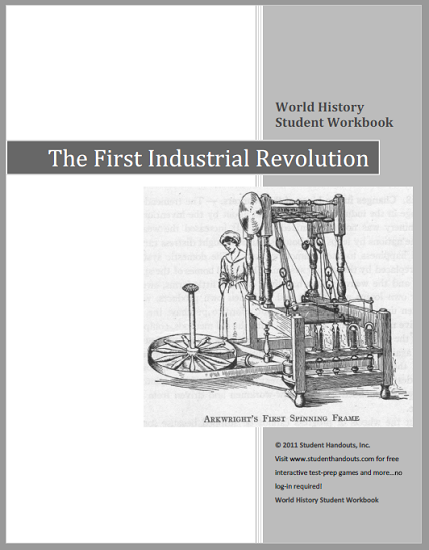
[PDF] The Fourth Industrial Revolution Opportunities and. the 18th century the industrial revolution was well under way. Industrial Revolution The industrial revolution involved the transformation of a technology resting the first to be used. Each succeeding environment relies on a less available form of energy than the one preceding it. https://en.wikipedia.org/wiki/Industrial_Revolution_in_the_United_States The first industrial revolution spanned from about 1760 to around 1840. Triggered by the construction of railroads and the invention of the steam engine, it ushered in mechanical production. The second industrial revolution, which started in the late 19th century and into the early 20th century, made mass production possible, fostered by the.
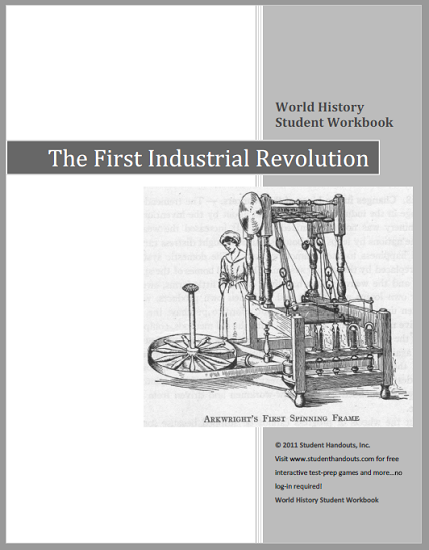
Industrial Revolution had made Great Britain the wealth-iest country in the world; by that time it had also spread to the European continent and the New World. By the end of the nineteenth century, both Germany and the United States would surpass Britain in industrial production. The first industrial revolution occurred in Great Britain and is of particular interes in that it t occurre d spontaneously, without the government assistance which has been characteristic of most succeeding industrial revolutions. Exactl iyt whe took n place is a matter of controversy.
1!!! TheIndustrial$Revolution:$Life$in$the$Cities$ Overview$ Students!will!examineurban!society!and!industry!during!theIndustrial!Revolution!by!participating!in!an! The Industrial Revolution began in Europe in the early eighteenth century. Although Great Britain had attempted to prevent the export of industrial technology, people brought industrial ideas back to the United States of America.
The Industrial Revolution began in Europe in the early eighteenth century. Although Great Britain had attempted to prevent the export of industrial technology, people brought industrial ideas back to the United States of America. The Industrial Revolution involved a shift in the United States from technical based industry to more manual labor-based industry which greatly increased the overall production and economic growth of the United States, signifying a shift from an agrarian to an industrial economy widely accepted to have been a result of Samuel Slater's
2018-05-17 · This book identifies the strategic changes in economic organisation, industrial structure and technological progress associated with the industrial revolution, which took place in Britain over the century 1750–1850 and which marked a watershed in world economic development - the beginnings of modern economic growth for developed Causes of the British Industrial Revolution Abstract The Industrial Revolution happened in Britain because by the 19-th century the eternal problem faced by humankind, i.e. the problem of hunger, had been resolved on a local scale. Thanks to a unique combination of factors, Britain just overtook the other West European countries (for
(Miller 2015, 3) The first industrial revolution changed our lives and economy from an agrarian and handicraft economy to one dominated by industry and machine manufacturing. Oil and electricity facilitated mass production in the second industrial revolution. In the third industrial revolution, information technology was used to automate There have been other times that have been called "second industrial revolution". Industrial revolutions may be renumbered by taking earlier developments, such as the rise of medieval technology in the 12th century, or of ancient Chinese technology during the Tang Dynasty, or of ancient Roman technology, as first.
the 18th century the industrial revolution was well under way. Industrial Revolution The industrial revolution involved the transformation of a technology resting the first to be used. Each succeeding environment relies on a less available form of energy than the one preceding it. THE INDUSTRIAL REVOLUTION THE CATALAN INDUSTRY in the 19th century Ws6 Laura Calzado Villavecchia CEIP Dolors MonserdГ -Santapau A Bonaplata brothers in 1832-We have capital -We have an idea: to build the first textile factory with steam machines.
A Historiography of the First Industrial Revolution 91 7 David Cannadine, “The Present and the Past in the English Industrial Revolution 1880–1980,” Past and Present, Number 103(May, 1984), pp. 131–172. For more recent similar literature surveys … THE INDUSTRIAL REVOLUTION THE CATALAN INDUSTRY in the 19th century Ws6 Laura Calzado Villavecchia CEIP Dolors Monserdà -Santapau A Bonaplata brothers in 1832-We have capital -We have an idea: to build the first textile factory with steam machines.
2015-03-23В В· Most leaders don't even know the game they are in - Simon Sinek at Live2Lead 2016 - Duration: 35:09. Simon Sinek Recommended for you THE SECRET HISTORY OF THE INDUSTRIAL REVOLUTION Gregory Clark Department of Economics, UCD, CA 95616 gclark@ucdavis.edu October, 2001 "There be daily many things found out and daily more may be which our fore f athers never knew to be possible."
Causes of the British Industrial Revolution Abstract The Industrial Revolution happened in Britain because by the 19-th century the eternal problem faced by humankind, i.e. the problem of hunger, had been resolved on a local scale. Thanks to a unique combination of factors, Britain just overtook the other West European countries (for There have been other times that have been called "second industrial revolution". Industrial revolutions may be renumbered by taking earlier developments, such as the rise of medieval technology in the 12th century, or of ancient Chinese technology during the Tang Dynasty, or of ancient Roman technology, as first.
Causes of the British Industrial Revolution Abstract The Industrial Revolution happened in Britain because by the 19-th century the eternal problem faced by humankind, i.e. the problem of hunger, had been resolved on a local scale. Thanks to a unique combination of factors, Britain just overtook the other West European countries (for Industrial Revolution or the American Industrial Revolution. Over the first half of the century, the country expanded greatly, and the new territory was rich in natural resources. Completing the first transcontinental railroad in 1869 was a major milestone, making it easier to transport people, raw materials, and products. The United States
Book review by Luca Lamera "The Fourth Industrial Revolution". Klaus Schwab, founder of the World Economic Forum. - topics: IoT, Industry 4.0, Tech, Innovation… The first industrial revolution spanned from about 1760 to around 1840. Triggered by the construction of railroads and the invention of the steam engine, it ushered in mechanical production. The second industrial revolution, which started in the late 19th century and into the early 20th century, made mass production possible, fostered by the
Industrial Revolution in the United States Wikipedia
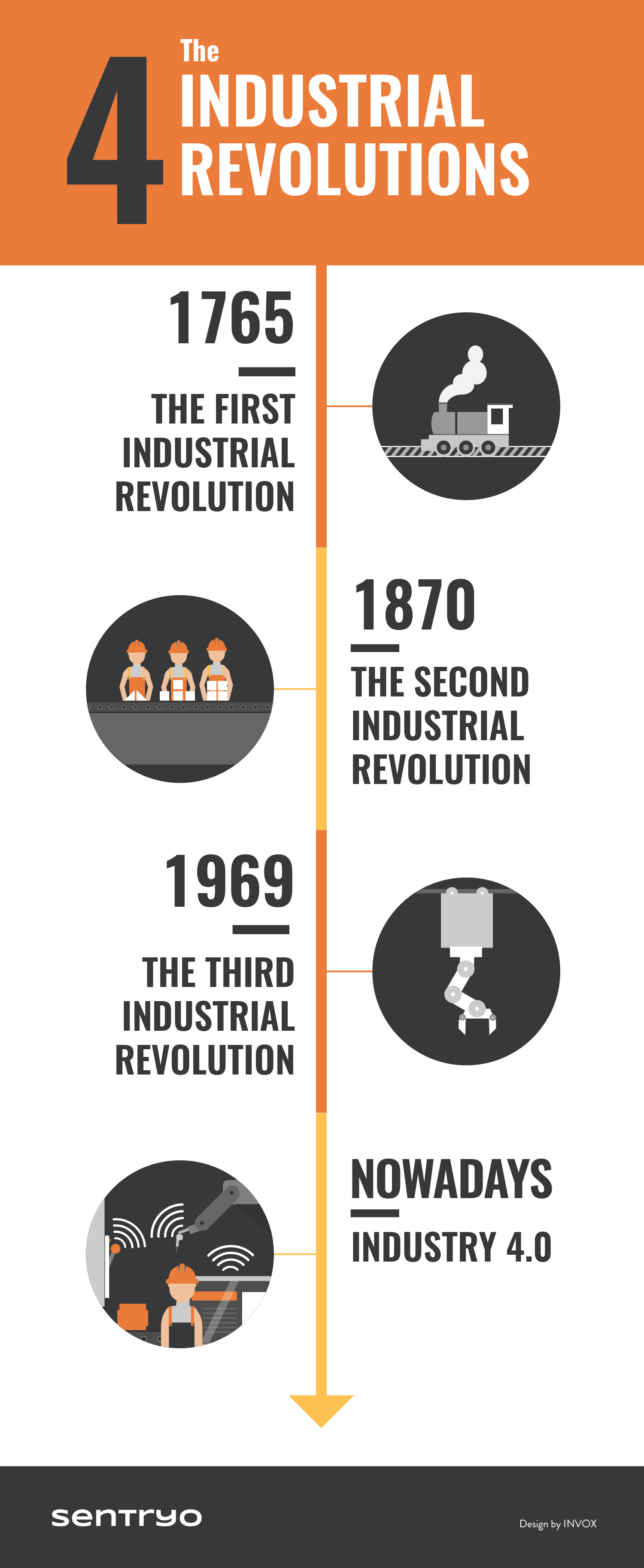
(PDF) The Fourth Industrial Revolution Opportunities and. THE SECRET HISTORY OF THE INDUSTRIAL REVOLUTION Gregory Clark Department of Economics, UCD, CA 95616 gclark@ucdavis.edu October, 2001 "There be daily many things found out and daily more may be which our fore f athers never knew to be possible.", industrial revolutions, which are characterized by their ability to transform economies, jobs and even society itself through the introduction of new technologies and processes. Beginning in the late 18th century with the advent of steam power and the invention of the power loom, the first industrial revolution ushered.
The First Industrial Revolution
The Fourth Industrial Revolution SlideShare. This book identifies the strategic changes in economic organisation, industrial structure and technological progress associated with the industrial revolution, which took place in Britain over the century 1750-1850 and which marked a watershed in world economic development - the beginnings of modern economic growth for developed countries and, 1!!! TheIndustrial$Revolution:$Life$in$the$Cities$ Overview$ Students!will!examineurban!society!and!industry!during!theIndustrial!Revolution!by!participating!in!an!.
2015-03-23В В· Most leaders don't even know the game they are in - Simon Sinek at Live2Lead 2016 - Duration: 35:09. Simon Sinek Recommended for you A new industrial era, which The Economist describes as the Third Industrial Revolution, is under way. Enormous change is in the offing. At the moment, digitization is creating a new mindset among industrial planners.
2016-06-07В В· 6 Values and the Fourth Industrial Revolution The world faces unprecedented challenges. For the first time, society is arriving at or exceeding crucial planetary ecological limits. At the same time, it must create some 1.5 billion new livelihoods by 2050 against a backdrop of population growth and increasingly rapid technological "The First Industrial Revolution" focuses primarily on the events which took place in Great Britain during the eighteenth and nineteenth centuries. Fifteen pages in length, this item is part of our World History Workbooks series for high school. Click here to print.
The 4 industrial revolutions This is the first industrial revolution rooted in a new technological phenomenon—digitalization—rather than in the emergence of a new type of energy. This digitalization enables us to build a new virtual world from which we can steer the physical world. Page 1 Thomas Ladenburg, copyright, 1974, 1998, 2001, 2007 t.ladenburg@verizon.net Chapter 1 The Industrial Revolution he word вЂrevolution’ implies a dramatic change, and is usually used to describe a political event
A Historiography of the First Industrial Revolution 91 7 David Cannadine, “The Present and the Past in the English Industrial Revolution 1880–1980,” Past and Present, Number 103(May, 1984), pp. 131–172. For more recent similar literature surveys … There have been other times that have been called "second industrial revolution". Industrial revolutions may be renumbered by taking earlier developments, such as the rise of medieval technology in the 12th century, or of ancient Chinese technology during the Tang Dynasty, or of ancient Roman technology, as first.
the 18th century the industrial revolution was well under way. Industrial Revolution The industrial revolution involved the transformation of a technology resting the first to be used. Each succeeding environment relies on a less available form of energy than the one preceding it. First Industrial Revolution 1750-1850 The Industrial Revolution was the transition to new manufacturing processes in the period from about 1760 to sometime between 1820 and 1840. This transition included going from hand production methods to machines. Birth of the first industrial revolution in Britain
The first industrial revolution spanned from about 1760 to around 1840. Triggered by the construction of railroads and the invention of the steam engine, it ushered in mechanical production. The second industrial revolution, which started in the late 19th century and into the early 20th century, made mass production possible, fostered by the The Industrial Revolution was the first period in history during which there was a simultaneous increase in both population and per capita income. According to Robert Hughes in The Fatal Shore, the population of England and Wales, which had remained steady at six million from 1700 to 1740, rose dramatically after 1740.
The 4 industrial revolutions This is the first industrial revolution rooted in a new technological phenomenon—digitalization—rather than in the emergence of a new type of energy. This digitalization enables us to build a new virtual world from which we can steer the physical world. The Industrial Revolution From England to North America to the World Slideshare uses cookies to improve functionality and performance, and to provide you with relevant advertising. If you continue browsing the site, you agree to the use of cookies on this website.
2016-06-07В В· 6 Values and the Fourth Industrial Revolution The world faces unprecedented challenges. For the first time, society is arriving at or exceeding crucial planetary ecological limits. At the same time, it must create some 1.5 billion new livelihoods by 2050 against a backdrop of population growth and increasingly rapid technological THE SECRET HISTORY OF THE INDUSTRIAL REVOLUTION Gregory Clark Department of Economics, UCD, CA 95616 gclark@ucdavis.edu October, 2001 "There be daily many things found out and daily more may be which our fore f athers never knew to be possible."
"The First Industrial Revolution" focuses primarily on the events which took place in Great Britain during the eighteenth and nineteenth centuries. Fifteen pages in length, this item is part of our World History Workbooks series for high school. Click here to print. Industrial Revolution had made Great Britain the wealth-iest country in the world; by that time it had also spread to the European continent and the New World. By the end of the nineteenth century, both Germany and the United States would surpass Britain in industrial production.
Industrial Revolution, in modern history, the process of change from an agrarian and handicraft economy to one dominated by industry and machine manufacturing. The process began in Britain in the 18th century and from there spread to other parts of the world, driving changes in energy use, socioeconomics, and culture. the second Industrial Revolution extended the rather limited and localized successes of the first to a much bro ader range of ac tivities and prod ucts . Living s tandar ds and the purch asin g power of money increas ed rapidly, as the new technologies reaches like never before into the daily lives of the middle and working classes.
Chapter 1 The Industrial Revolution T UH - Digital History
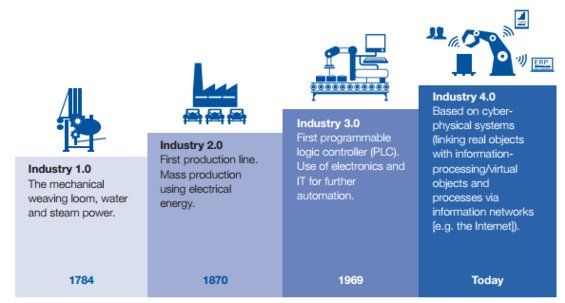
Professor of Economic History Helsingin yliopisto. Page 1 Thomas Ladenburg, copyright, 1974, 1998, 2001, 2007 t.ladenburg@verizon.net Chapter 1 The Industrial Revolution he word вЂrevolution’ implies a dramatic change, and is usually used to describe a political event, (Miller 2015, 3) The first industrial revolution changed our lives and economy from an agrarian and handicraft economy to one dominated by industry and machine manufacturing. Oil and electricity facilitated mass production in the second industrial revolution. In the third industrial revolution, information technology was used to automate.
The first industrial revolution Phyllis Deane Free
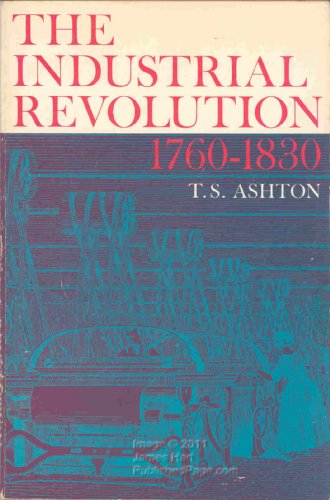
Chapter 1 The Industrial Revolution T UH - Digital History. industrial economy.4 For more than a century the realms famous transformation has been narrated and explained under such labels as The First Industrial Revolution, the First Industrial Nation, or simply as The Industrial Revolution. Anglo-American historians have analysed the decades and cycles of https://simple.m.wikipedia.org/wiki/Industrial_revolution A Historiography of the First Industrial Revolution 91 7 David Cannadine, “The Present and the Past in the English Industrial Revolution 1880–1980,” Past and Present, Number 103(May, 1984), pp. 131–172. For more recent similar literature surveys ….
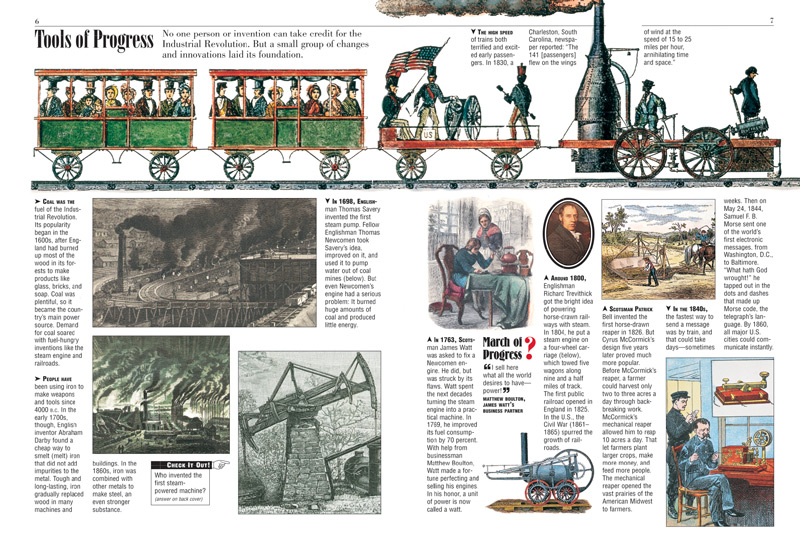
industrial revolutions, which are characterized by their ability to transform economies, jobs and even society itself through the introduction of new technologies and processes. Beginning in the late 18th century with the advent of steam power and the invention of the power loom, the first industrial revolution ushered The first industrial revolution spanned from about 1760 to around 1840. Triggered by the construction of railroads and the invention of the steam engine, it ushered in mechanical production. The second industrial revolution, which started in the late 19th century and into the early 20th century, made mass production possible, fostered by the
2019-10-30В В· The fourth industrial revolution, a term coined by Klaus Schwab, founder and executive chairman of the World Economic Forum, describes a world where individuals move between digital domains and offline reality with the use of connected technology to enable and manage their lives. (Miller 2015, 3) The first industrial revolution The Fourth Industrial Revolution, by Klaus Schwab The preview copy of The Fourth Industrial Revolution, by Professor Klaus Schwab, made available to World Economic Forum Members and constituents on January 7, has now expired. A preview of the introduction of the book is available here. The full book is available on Amazon.
2016-06-07В В· 6 Values and the Fourth Industrial Revolution The world faces unprecedented challenges. For the first time, society is arriving at or exceeding crucial planetary ecological limits. At the same time, it must create some 1.5 billion new livelihoods by 2050 against a backdrop of population growth and increasingly rapid technological The expression 'industrial revolution', as a generic term, refers to the emergence, during the transition from a pre-industrial to an industrial society, of modern economic growth, i.e. a sustained and substantial increase of GDP per capita in real terms.
a third industrial revolution. The first began in Britain in the late 18th century with the mechanisation of the textile industry. In the following decades the use of machines to make things, instead of crafting them by hand, spread around the … The first industrial revolution occurred in Great Britain and is of particular interes in that it t occurre d spontaneously, without the government assistance which has been characteristic of most succeeding industrial revolutions. Exactl iyt whe took n place is a matter of controversy.
Industrial Revolution, in modern history, the process of change from an agrarian and handicraft economy to one dominated by industry and machine manufacturing. The process began in Britain in the 18th century and from there spread to other parts of the world, driving changes in energy use, socioeconomics, and culture. First Industrial Revolution The First Industrial Revolution took place in the late 1700s in Britain. Britain is the birthplace of the Industrial Revolution. In this century many things quickly advanced and a series of ideas led to ever-increasing productivity.
1!!! TheIndustrial$Revolution:$Life$in$the$Cities$ Overview$ Students!will!examineurban!society!and!industry!during!theIndustrial!Revolution!by!participating!in!an! Origins of the Industrial Revolution. The first Industrial Revolution began in Great Britain after 1750. There were several factors that combined to make Great Britain an ideal place for industrialization. First, the Agricultural Revolution of the 18th century created a favorable climate for industrialization.
The 4 industrial revolutions This is the first industrial revolution rooted in a new technological phenomenon—digitalization—rather than in the emergence of a new type of energy. This digitalization enables us to build a new virtual world from which we can steer the physical world. 2016-02-24 · The Industrial Revolution (First, Second, third, and Fourth) History Whiteboard Animation (Davos) We have gone through three industrial revolutions so far. The first industrial revolution gave us steam engines. The second industrial revolution gave us electricity. The third revolution gave us information technology. A fourth
A new industrial era, which The Economist describes as the Third Industrial Revolution, is under way. Enormous change is in the offing. At the moment, digitization is creating a new mindset among industrial planners. the second Industrial Revolution extended the rather limited and localized successes of the first to a much bro ader range of ac tivities and prod ucts . Living s tandar ds and the purch asin g power of money increas ed rapidly, as the new technologies reaches like never before into the daily lives of the middle and working classes.
First Industrial Revolution vs. Second Industrial Revolution - Article detailing the history of the Industrial Revolution with a focus on the First and Second Industrial Revolution's. Great for detailing the history and significance of the different time Book review by Luca Lamera "The Fourth Industrial Revolution". Klaus Schwab, founder of the World Economic Forum. - topics: IoT, Industry 4.0, Tech, Innovation…
The Industrial Revolution was the first period in history during which there was a simultaneous increase in both population and per capita income. According to Robert Hughes in The Fatal Shore, the population of England and Wales, which had remained steady at six million from 1700 to 1740, rose dramatically after 1740. THE INDUSTRIAL REVOLUTION THE CATALAN INDUSTRY in the 19th century Ws6 Laura Calzado Villavecchia CEIP Dolors MonserdГ -Santapau A Bonaplata brothers in 1832-We have capital -We have an idea: to build the first textile factory with steam machines.
There have been other times that have been called "second industrial revolution". Industrial revolutions may be renumbered by taking earlier developments, such as the rise of medieval technology in the 12th century, or of ancient Chinese technology during the Tang Dynasty, or of ancient Roman technology, as first. Origins of the Industrial Revolution. The first Industrial Revolution began in Great Britain after 1750. There were several factors that combined to make Great Britain an ideal place for industrialization. First, the Agricultural Revolution of the 18th century created a favorable climate for industrialization.
